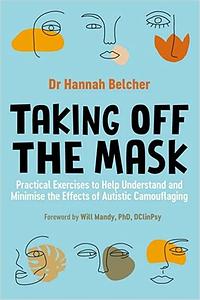Take a photo of a barcode or cover
slow-paced
informative
medium-paced
Moderate: Ableism, Mental illness, Self harm
informative
slow-paced
emotional
hopeful
informative
reflective
medium-paced
informative
reflective
medium-paced
emotional
hopeful
informative
reflective
slow-paced
hopeful
informative
fast-paced
informative
medium-paced
A decent book, especially if it's your first introduction to masking and autism. A good amount of exercises to get someone thinking about how they mask and experience masking.
I would caution that while the author does mention to not force yourself to unmask in dangerous situations, there was a lack of awareness or emphasis on the BIPOC and queer experience. In particular there is an exercise where she mentions stimming on a public train, and while this may also be a difference in country, I do not believe the UK is 100% safe for nonwhite-heterosexual-cisgendered individuals.
For Americans, BIPOC, and visibly queer people, I would suggest reading Unmasking Autism by Devon Price instead. I read that book first and did not end up finding anything here that wasn't already covered outside a few CBT exercises, and there was more emphasis on the intersectional issues autistic people can face and how that increases their need for masking and the danger of unmasking. There was also emphasis on the importance and validity of self-diagnosing under the US government.
I understand this is a book written in the UK for UK residences but I found it suggested on American BookTok which is why I am bringing this up. It's important that any American reading it understands there are differences to watch out for because of this. Also it is important for autistic citizens of the UK to understand the many more barriers their USA cousins have, and how important it is not to invalidate anyone for not having a professional diagnosis or make the "goal" to have one, when many times it is financially impossible and also actively dangerous to an individual's rights as parents, humans, etc.
Lastly, I'd like to point out it is important to acknowledge that low-support need individuals and those who can opt out of diagnosis are incredibly privileged. The author states at the end that she understands this book "only serves those of us without severe intellectual disabilities", but also says it is our job to speak up because of it. It is because of this place of privilege that we need to make it a point to uplift our high-support need community's voices instead, and make sure we listen to them and do not fall into aspiesupremacy. Listening to a variety of autistic perspectives is what will lead us to a healthier and better world where people's needs are met.
I would caution that while the author does mention to not force yourself to unmask in dangerous situations, there was a lack of awareness or emphasis on the BIPOC and queer experience. In particular there is an exercise where she mentions stimming on a public train, and while this may also be a difference in country, I do not believe the UK is 100% safe for nonwhite-heterosexual-cisgendered individuals.
For Americans, BIPOC, and visibly queer people, I would suggest reading Unmasking Autism by Devon Price instead. I read that book first and did not end up finding anything here that wasn't already covered outside a few CBT exercises, and there was more emphasis on the intersectional issues autistic people can face and how that increases their need for masking and the danger of unmasking. There was also emphasis on the importance and validity of self-diagnosing under the US government.
I understand this is a book written in the UK for UK residences but I found it suggested on American BookTok which is why I am bringing this up. It's important that any American reading it understands there are differences to watch out for because of this. Also it is important for autistic citizens of the UK to understand the many more barriers their USA cousins have, and how important it is not to invalidate anyone for not having a professional diagnosis or make the "goal" to have one, when many times it is financially impossible and also actively dangerous to an individual's rights as parents, humans, etc.
Lastly, I'd like to point out it is important to acknowledge that low-support need individuals and those who can opt out of diagnosis are incredibly privileged. The author states at the end that she understands this book "only serves those of us without severe intellectual disabilities", but also says it is our job to speak up because of it. It is because of this place of privilege that we need to make it a point to uplift our high-support need community's voices instead, and make sure we listen to them and do not fall into aspiesupremacy. Listening to a variety of autistic perspectives is what will lead us to a healthier and better world where people's needs are met.
informative
inspiring
medium-paced





